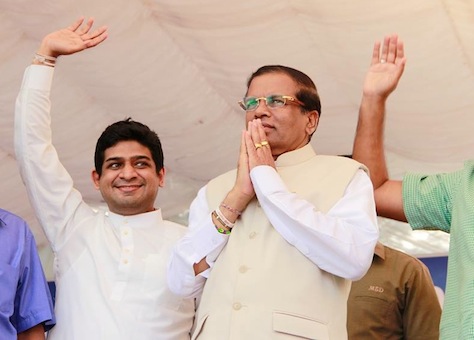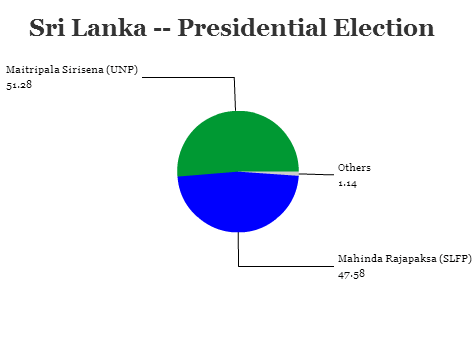
Sri Lanka has avoided all the dark warnings of coups and political tumult — for the time being.![]()
Former health minister and one-time ally Maitripala Sirisena easily defeated two-term incumbent Mahinda Rajapaksa, who called a presidential election two years early. Hoping to take advantage of a scattered opposition, Rajapaksa believed he would slide to an easy reelection to a third six-year term. Instead, Sirisena, the general secretary of Rajapaksa’s own party, the Sri Lanka Freedom Party (SLFP, ශ්රී ලංකා නිදහස් පක්ෂය), promptly resigned as Rajapaksa’s minister and led 25 SLFP members of the Sri Lankan parliament into the opposition coalition, upending what Rajapaksa thought would be a cakewalk.
Despite the fact that, like Rajapaksa, Sirisena comes from the country’s Sinhalese majority and practices Buddhism, he won significant support from Tamil-speaking Moors (who practice Islam) and Tamils (who practice Hinduism). That, in tandem with the support of a significant set of elites and Sinhalese voters who had soured on Rajapaksa’s decade-long rule, was enough to deliver to him 51.28% of the vote, versus just 47.58% for Rajapaksa.
In the space of six weeks, Sirisena has gone from the general secretary of the SLFP and top minister in the Rajapksa government to the president-elect and head of the titular coalition led by the opposition United National Party (UNP, එක්සත් ජාතික පක්ෂය), which traditional draws more support from Tamil-speaking minorities and which also embraces a more free-market liberal and center-right ideological persuasion.
* * * * *
RELATED: Tumultuous election a test for Sri Lankan democracy
* * * * *
Despite ominous warnings that Rajapaksa would deploy the military if he lost the election, the incumbent stepped down and moved out of the presidential palace, Temple Trees, immediately, paving the way for what could be a surprisingly easy and peaceful transfer of power for a country where elections and politics often collide in violence.
While Sirisena is the clearest winner of Thursday’s vote, Indian prime minister Narendra Modi is nearly as much of a winner. That’s because Sirisena is expected to strengthen ties with India at the expense of the People’s Republic of China. Increasingly, Rajapaksa looked to Beijing, not New Delhi, for international support, including billions in soft loans from the Chinese government, which in turn looked to Sri Lanka as its foothold in south Asia and the Indian Ocean. No longer. Sirisena has pledged to cancel several Chinese development projects that had become increasingly controversial.
